BACKGROUND
The Eskom Power Plant Engineering Institute (EPPEI) was established in 2012 and offers opportunities for research and post-graduation education in the power industry. Academic specialists at six leading universities, together with eight universities of technology in South Africa, team up with industry specialists to teach, mentor and guide our power industry students. This initiative provides for the upgrade of qualifications and skills of Eskom's engineers and technical staff .
Different specialisation centres were established at the 6 leading universities and include:
- Emission Control – North-West University
- Energy Efficiency – University of Cape Town
- Combustion Engineering - University of the Witwatersrand
- Materials Engineering - University of Cape Town
- Plant Asset Management - University of Pretoria
- High Voltage Engineering AC - University of the Witwatersrand
- High Voltage Engineering DC - University of Kwa-Zulu-Natal
- Renewable Energy – Stellenbosch University
Emissions Control at North-West University
The Specialisation Centre for Emissions Control at North-West University operates in two faculties namely:
The School for Geo- and Spatial Sciences
School for Geo- and Spatial Sciences
The focus here is on monitoring and quantifying existing emissions from Eskom power stations in terms of greenhouse gases and pollutants. Also of importance is to understand the atmosphere into which emissions are released, the impact of emissions on air quality, long-term deposition to the biosphere and hydrosphere and contributions to the atmospheric greenhouse gas load.
Some of the present and past research topics include
- Evaluation of Gaussian dispersion models to assess urban air quality in South Africa
- Impacts and control of coal-fired power station emissions in South Africa
- The Valuarisation of coal combustion products
Contact details:
Academic lead:
Prof Stuart Piketh
Tel: (018) 299 1582
Email: stuart.piketh@nwu.ac.za
Specialisation Centre Manager:
Dr Roelof Burger
Tel: (018) 299 4269
Email: roelof.burger@nwu.ac.za
The School of Chemical and Materials Engineering
School of Chemical and Materials Engineering
Focuses on improving the performance of existing mitigation technologies for particulate matter, SO2 NOx, CO2 and Hg for South African coal characteristics and plant conditions. Masters and PhD studies can be pursued in topics related to the following research themes:
1. Particulate matter
- Electrostatic Precipitation (ESP)
- Fabric Filter Plant (FFP)
- Fly ash material analysis
- Circulating Fluidized Beds (CFB)
2. Capturing greenhouse gases
- Desulfurization studies (wet and dry)
-
Sorbent characterisation
Some of the present and past research topics include:
- The Simulation of an Industrial Wet Flue Gas Desulfurization Absorber
- Reduction of Wet Flue Gas Desulphurisation water losses through flue gas heat recovery
- Computational fluid dynamics modelling of an electrostatic precipitator
- The influence of SO3 conditioning on the resistivity of selected South African fly ashes
- Investigating the effect of South African fly ash resistivity on the collection efficiency of electrostatic precipitators
Contact details:
Academic lead:
Prof Hein Neomagus
Tel: (018) 299 1991
Email: hein.neomagus@nwu.ac.za
Specialisation Centre Manager:
Mr Louis le Grange
Tel: (018) 299 1664
Email: 10066578@nwu.ac.za
School of Chemical and Materials Engineering
Focuses on improving the performance of existing mitigation technologies for particulate matter, SO2 NOx, CO2 and Hg for South African coal characteristics and plant conditions. Masters and PhD studies can be pursued in topics related to the following research themes:
1. Particulate matter - see examples below
- Electrostatic Precipitation (ESP)
- Fabric Filter Plant (FFP)
- Fly ash material analysis
- Circulating Fluidized Beds (CFB)
Electrostatic Precipitation (ESP
Electrostatic Precipitation (ESP)
Operation of ESPs is studied experimentally with the aim of developing detailed numerical and empirical models.
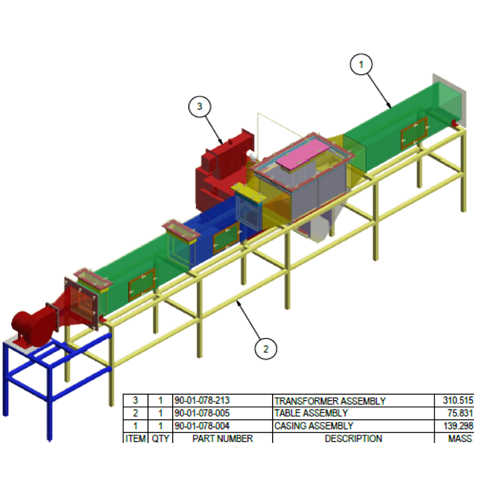
Electrostatic Precipitation (ESP) (Cont’d)
Electrohydrodynamic (EHD) flow phenomena
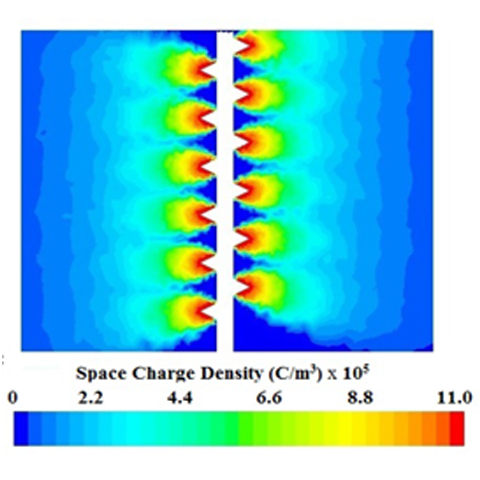
Electrostatic Precipitation (ESP) (Cont’d)
CFD modelling of electrostatic fields in an ESP
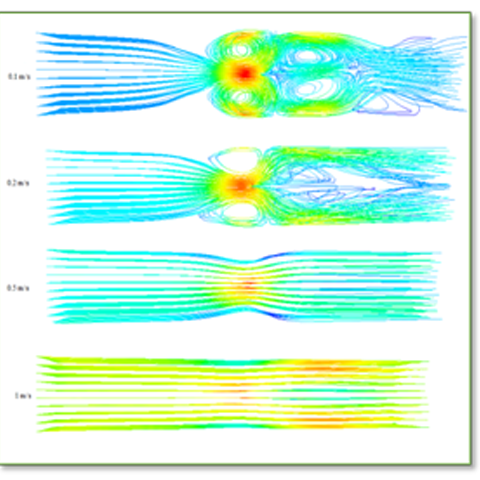
Fabric Filter Plant (FFP)
Fabric Filter Plant (FFP)
Experimental rigs at NWU

Fabric Filter Plant (FFP)
Capture of ash in bag filters is studied to determine
the required bag material properties.
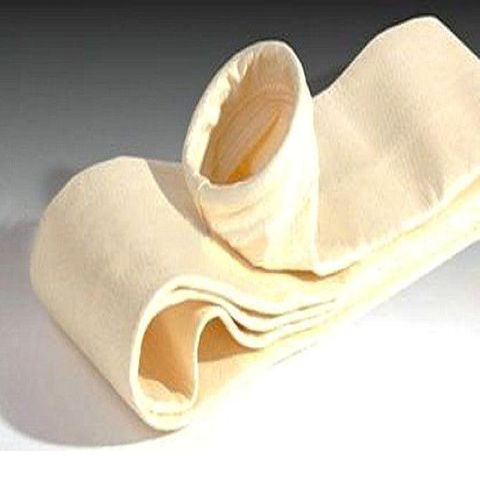
Fly ash material analysis
Resistivity measurement facility at NWU. From left to right: Mr. Jandri Ribberink, Prof Hein Neomagus and Dr Dawie Branken.
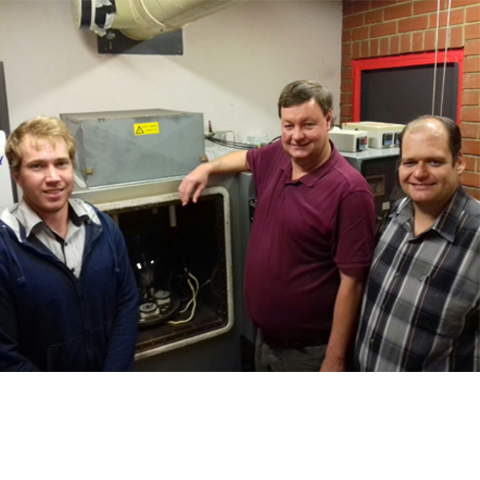
Fly ash resistivity measurement
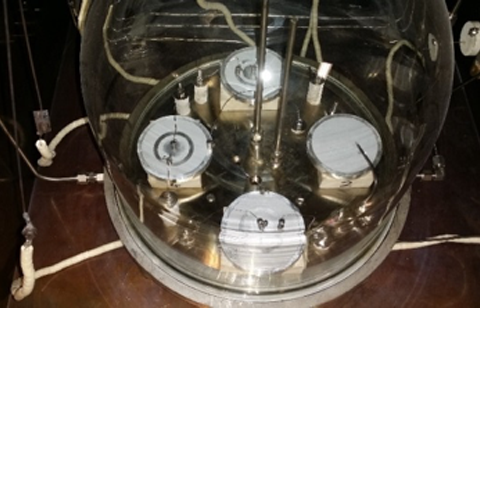
2. Capturing greenhouse gases
- Desulfurization studies (wet and dry)
- Sorbent characterisation
Desulfurization studies (wet and dry)
Desulphurisation studies
- Both wet and dry desulfurization technologies are investigated. Current research themes include:
- Modeling of wet flue gas desulphurization plants
- Reduction of wet flue gas desulphurization water consumption
- Modelling of dry flue gas desulphurization using fluidized beds
Modeling of wet flue gas desulphurization plants

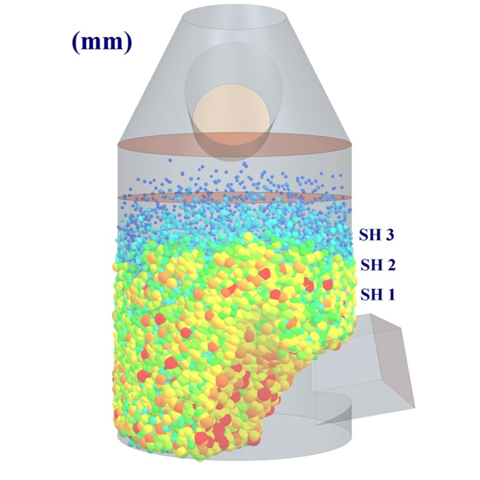
Some of the present and past research topics include:
- The Simulation of an Industrial Wet Flue Gas Desulfurization Absorber
- Reduction of Wet Flue Gas Desulphurisation water losses through flue gas heat recovery
- Computational fluid dynamics modelling of an electrostatic precipitator
- The influence of SO3 conditioning on the resistivity of selected South African fly ashes
- Investigating the effect of South African fly ash resistivity on the collection efficiency of electrostatic precipitators
Contact details:
Academic lead:
Prof Hein Neomagus
Tel: (018) 299 1991
Email: hein.neomagus@nwu.ac.za
Specialisation Centre Manager:
Mr Louis le Grange
Tel: (018) 299 1664
Email: 10066578@nwu.ac.za
